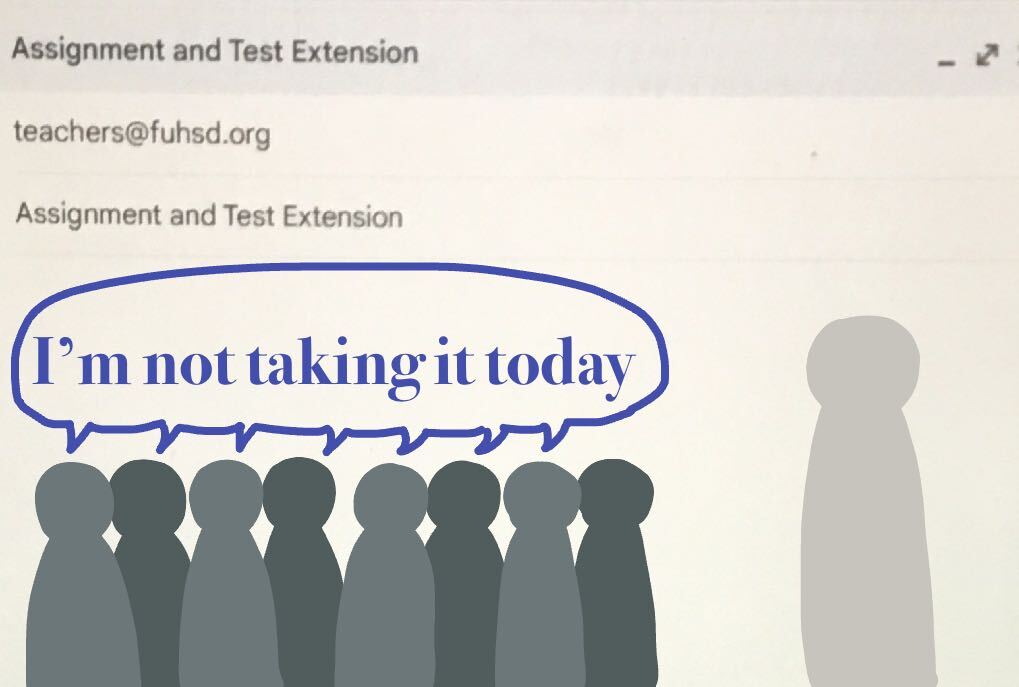When it comes to students asking for extensions on tests, Biology teacher Pamela Chow acknowledges that it can be a slippery slope. Although she believes that her policy to allow students to take tests at a later date can establish better trust between herself and her students, she admits that this can lead to students asking for extensions in an untimely manner.
“I do think that sometimes it does lead to an unintended consequence, and I probably need to be clear about it because sometimes students will ask at the last moment, ‘Can I not take this today?’” Chow said. “I prefer they have it established earlier that, ‘Okay, I’m not ready. I shouldn’t take it now ’ as opposed to ‘Let me ask her at the last moment’ because I think that’s more of a moment of panic.”
While junior Yuktha Prasanth hasn’t seen many students ask for extensions for tests, she recalls that when a friend of hers studied for the wrong unit, her teacher was willing to let her take the quiz a day later. Prasanth feels that these situations can create an unfair advantage if teachers aren’t clear with their test extension policy, as the majority of other students aren’t aware that this is an option.
“Those kinds of policies where teachers let students take a test on a later date are more fair than some teachers who I know would not be willing to change their extension policies because of other circumstances,” Prasanth said. “But I feel like other than extenuating circumstances, for other reasons, I don’t think there’s a valid excuse to not take a test because it’s unfair to all the people who did study for the test on time.”
Senior Rigved Barve echoes Prasanth’s opinion that generally speaking, students shouldn’t have to ask for extension policies as everyone has the same workload and should be able to manage their work responsibly.
“I think extension policies if you haven’t been able to come to school are good, so that it gives you a buffer time to catch up on stuff,“ Barve said. “But if you’ve been in school, then extension policies seem unfair for everyone that’s doing the work, because then you get extra time for no real reason.”
On the other hand, senior Piyush Shanbhag views extension policies as opportunities for students to manage their stress levels. While he understands that certain teachers are less lenient because they have a tighter schedule due to having a lot of work to grade, he feels that for classes where the teachers don’t start grading the students’ work immediately, it shouldn’t make a big difference as long as the student turns in their work before the teacher starts grading.
“I’d say that students don’t really take advantage of extension policies,” Shanbhag said. “As long as it’s within the policy of that certain teacher, I don’t think anyone abuses it because if it’s in a syllabus, and it’s in the policy, you should have as much freedom to use it to that extent.”
Shanbhag mentions that some classes have systems in place in order to hold students accountable for late work. For example, one such system from his Honors American Literature class was “Independent Scholarship,” which negatively impacted students’ grade if they submitted late too often. Because of this, students made sure to hold themselves accountable for their deadlines better, and only used extension policies a few times in a semester.
Prasanth notes how the classroom dynamic can affect how often students use extension policies. She says that some students are comfortable enough with their teachers to use these policies freely, but there are others who don’t feel ready to share their personal circumstances. Barve feels that although initial usage of these policies doesn’t affect student-teacher trust, overuse can negatively affect it.
“If the teacher does catch on to you abusing or misusing the policy — I saw an example of that last week — then I think that teachers get suspicious,” Barve said. “They do notice it as a red flag.”
Shanbhag thinks otherwise, stating that as long as a student follows the rules outlined in the syllabus, there should be no issues between student and teacher.
“I don’t think the trust between students and teachers is impacted at all by misuse, because they’ve clearly outlined it in the syllabus,” Shanbhag said. “Because of that, if I follow the policies and use the extensions based on that policy, it never even incurs a conversation because it was clearly outlined in the first day of school itself.”
Chow says that she tries to be trustful and understanding of her students and accommodate their needs. However, she also wants students to learn to take responsibility for themselves instead of relying on last-minute extensions.
“It also gets a little tricky in terms of fairness and whatnot, ” Chow said. “I’m trying to be accommodating, but I do want them to be planning themselves out better so that they can ask for help and ask for the extension if they need it, but not as sort of a panic moment — more as like, ‘Okay, I’ve been able to really clearly assess that I’m not going to be ready for this thing for X, Y or Z reasons. So can I have an extension?’”












